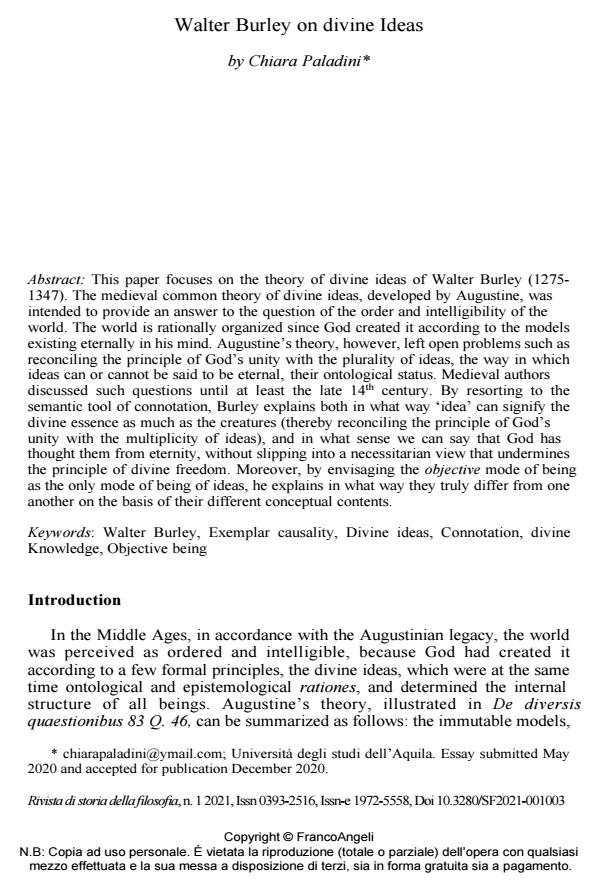Walter Burley on divine Ideas
Titolo Rivista RIVISTA DI STORIA DELLA FILOSOFIA
Autori/Curatori Chiara Paladini
Anno di pubblicazione 2021 Fascicolo 2021/1
Lingua Inglese Numero pagine 26 P. 50-75 Dimensione file 245 KB
DOI 10.3280/SF2021-001003
Il DOI è il codice a barre della proprietà intellettuale: per saperne di più
clicca qui
Qui sotto puoi vedere in anteprima la prima pagina di questo articolo.
Se questo articolo ti interessa, lo puoi acquistare (e scaricare in formato pdf) seguendo le facili indicazioni per acquistare il download credit. Acquista Download Credits per scaricare questo Articolo in formato PDF

FrancoAngeli è membro della Publishers International Linking Association, Inc (PILA), associazione indipendente e non profit per facilitare (attraverso i servizi tecnologici implementati da CrossRef.org) l’accesso degli studiosi ai contenuti digitali nelle pubblicazioni professionali e scientifiche.
This paper focuses on the theory of divine ideas of Walter Burley (1275-1347). The medieval common theory of divine ideas, developed by Augustine, was intended to provide an answer to the question of the order and intelligibility of the world. The world is rationally organized since God created it according to the models existing eternally in his mind. Augustine’s theory, however, left open problems such as reconciling the principle of God’s unity with the plurality of ideas, the way in which ideas can or cannot be said to be eternal, their ontological status. Medieval authors discussed such questions until at least the late 14th century. By resorting to the semantic tool of connotation, Burley explains both in what way ‘idea’ can signify the divine essence as much as the creatures (thereby reconciling the principle of God’s unity with the multiplicity of ideas), and in what sense we can say that God has thought them from eternity, without slipping into a necessitarian view that undermines the principle of divine freedom. Moreover, by envisaging the objective mode of being as the only mode of being of ideas, he explains in what way they truly differ from one another on the basis of their different conceptual contents
Parole chiave:Walter Burley, Exemplar causality, Divine ideas, Connotation, divine Knowledge, Objective being
Chiara Paladini, Walter Burley on divine Ideas in "RIVISTA DI STORIA DELLA FILOSOFIA" 1/2021, pp 50-75, DOI: 10.3280/SF2021-001003